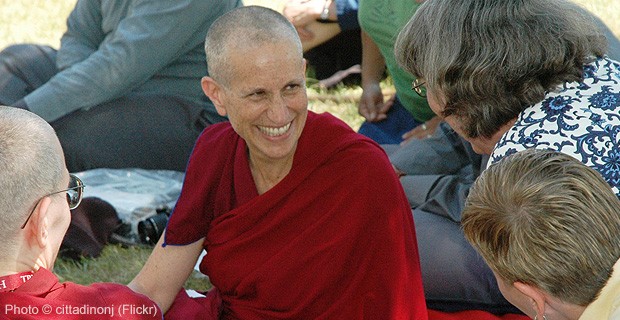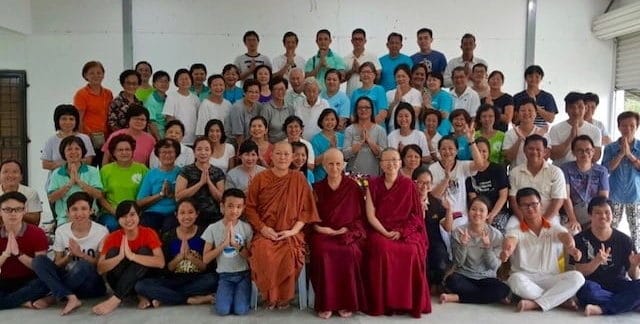Gomchen Lamrim review: Homage to compassion
Part of a series of teachings on the Gomchen Lamrim by Gomchen Ngawang Drakpa. Visit Gomchen Lamrim Study Guide for a full list of contemplation points for the series.
- Bodhicitta as the source of everything good in the world
- The causes for bodhisattvas
- How to generate compassion in the mind
- Guided meditation on generating compassion through the analogy of the water wheel
- Guided meditation on generating compassion through reflecting on the dukkha of sentient beings
Gomchen Lamrim 69 review: Homage to compassion (download)
Contemplation points
The water wheel
Imagine a bucket traveling in a well, tied to a wheel, controlled by an operator, going up to the top and down to the bottom over and over. It is drawn up with difficulty and strain, and easily descends back down to the bottom, clattering against the sides of the well, being battered and broken as it swings. Consider:
- Just as the bucket is tied by the rope, so we are bound by our past actions, contaminated by the afflicted emotions of attachment, anger, and ignorance.
- Just as the turning wheel depends on a person operating it, so our wandering in samsara depends upon consciousness.
- Just as the bucket travels down to the bottom of the well and up to the top, so we travel among the stations of samsara, being born over and over again. We don’t know what kind of form we will have in our next life, what ones we’ve had in previous lives, where we have lived before as hell beings, hungry ghosts, animals, humans, demigods, and gods.
- Just as the bucket descends easily in the well, but is difficult to draw upwards, even with hard work, our own tendencies of mind, our attachment, anger, ignorance, are such that we are easily drawn down into lower states of existence.
- So to interrupt that movement to the lower states, and move towards the higher states, we must put strong effort into our practice.
Wishing ourselves and others to be free of dukkha
Begin this contemplation by considering yourself:
- Imagine in front of you a replica of yourself.
- Reflect on the various sufferings/dukkha (dukkha of pain, dukkha of change, dukkha of pervasive conditioning).
- See yourself and your own unhappiness due to being subject to sickness, loss of a dear one, a sense of loneliness.
- Now wish yourself to be free from these conditions and their causes, Imagine what it would be like to be free from these. Really feel the newfound freedom from insecurity, fear, anxiety, anger, emotional neediness, and also have a strong sense of freedom from ignorance.
Next, do the same reflection towards teachers, those you respect:
- Be aware of the various suffering/dukkha/unhappiness, and extend that to the subtler levels of dukkha.
- Imagine that they are free from these conditions and their causes.
Now, turn your attention to strangers (Maybe you drove to town today and saw someone and can barely remember their face… Do the same meditation):
- First reflect on the various dukkha and unhappiness of this being.
- Then, go also into a subtler meditation on three kinds of dukkha.
- Then wish them to be free of these conditions and their causes.
- Imagine them to be free from ignorance, fear, anger, and such.
Now we apply this meditation to those we don’t like, people we disapprove of or feel threatened by, those who have harmed us in the past:
- If we really have great difficulties, we remember that they did that harm due to their internal unhappiness. People harm others when they themselves are unhappy.
- Imagine what this person would feel like if he/she were free from that pain and misery.
Now include all beings in your meditation:
- Wish each of them to be free from all kinds of suffering and their causes.
- Rest your mind in that compassionate thought.
Conclusion: To finish this practice, let’s go back to what His Holiness the Dalai Lama said in his book on compassion:
Spiritual practice is removing suffering on a deeper level. So these techniques involve an adjustment of attitude. So spiritual education basically means adjusting your thoughts in a beneficial way. This means that by adjusting counterproductive attitudes, you are held back from a particular kind of suffering and are thereby freed from it. Spiritual education protects or holds you and others back from misery.
Bhikshuni Thubten Jampa
Bhikshuni Thubten Jampa is from Hamburg, Germany. She took refuge in 2001. Bhikshuni Jampa studied politics and sociology for 5 years at the Humboldt-University in Berlin and received her master in Social Science in 2004. Afterwards she worked for the International Campaign for Tibet (ICT) in Berlin till 2007 and for the Tibetan Center Hamburg from 2007-2011. She completed monastic training at Sravasti Abbey, USA from 2011-2022. Today she lives in Hamburg again as a fully ordained nun (Bhikshuni) and studies full-time at the Dharma College at the Tibetan Centre. She occasionally offers lectures, retreats, regular meditations and a study group at the Buddhist Society Hamburg and if requested at the Tibetan Centre, among other places. Bhikshuni Thubten Jampa is also involved in the Hamburg Buddhist Society (BGH).


